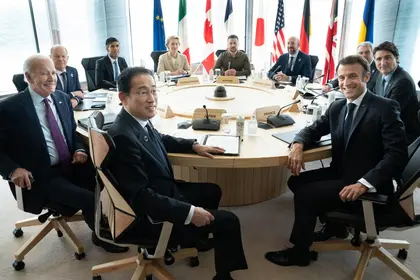At their summit in Hiroshima, the representatives of the G7 group declared solidarity with Ukraine, showed critical distance to China and committed to nuclear disarmament for the first time. Japan's prime minister and summit host Fumio Kishida spoke of a "historic summit in the city of peace". Commentators see an important signal of unity.
The biggest threat is China
Maintaining a clear stance towards China is correct, Italy’s La Repubblica believes:
JOIN US ON TELEGRAM
Follow our coverage of the war on the @Kyivpost_official.
“The aggressiveness of Xi Jinping's China (and also his way of not giving clear answers, as in the case of Russia) poses a threat to the economic and military security of the world against which the G7 members rightly need to defend themselves. The message is clear: we do not want to harm you or hinder your economic development, and we do not want to exclude you. ... But China must not harm us, and we must protect ourselves to avoid risks to our workers and industries.”
A strong, united front
Spain’s El Mundo is hopeful:
“The G-7 summit concluded with an image of strong unity based on adherence to universal principles in the face of threats from Russia and China. The summit stands for the defence of the rule of law, human dignity, human rights and free trade and demonstrated steely commitment to Ukraine's freedom. ... The fierce reaction of Beijing's and Moscow's spokespersons against the summit was evidence of their unease in the face of this Western front, which needs demonstrations of unity now more than ever.”

UK Contracts Arms Makers to Make Artillery Barrels for Ukraine
Beijing rightly in the pillory
The tough words against China should now be followed by action, Belgium’s La Libre Belgique demands:
“The seven most industrialized countries in the world drew up a catalogue of grievances and concerns, leaving nothing out. ... Together with the declared will to reduce dependence on the Chinese economy, which has become critical, this expression of clarity, albeit very belated, can only be welcomed. On the condition that words are soon followed by deeds and that the selfish pursuit of national interests by the G7 members does not destroy the unity they have demonstrated.”
Existential challenges
The G7 summit was intended to demonstrate the West's unity vis-à-vis Russia and China, notes Portugal’s Público:
“The Western leaders, who are more united on the Ukraine issue than on the confrontation with China, know that time is not on their side. Because unlike in dictatorships, uncertainty is characteristic of democracies. ... What is consensus today may no longer be so tomorrow. That's why it's important that the representatives of the free world now demonstrate unity before both allies and opponents in the face of the existential challenges posed by Russia and China.”
See the original here.
You can also highlight the text and press Ctrl + Enter










